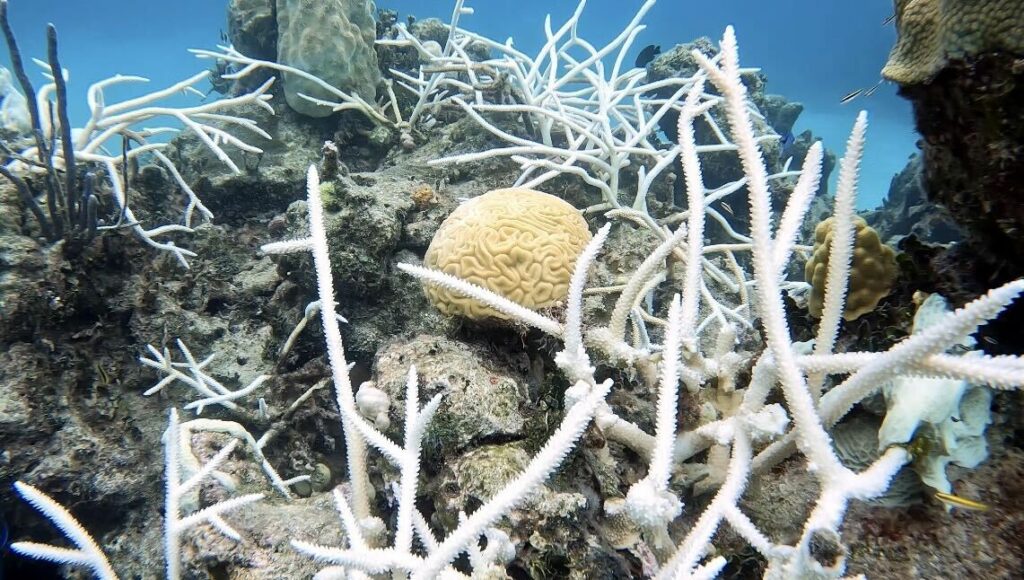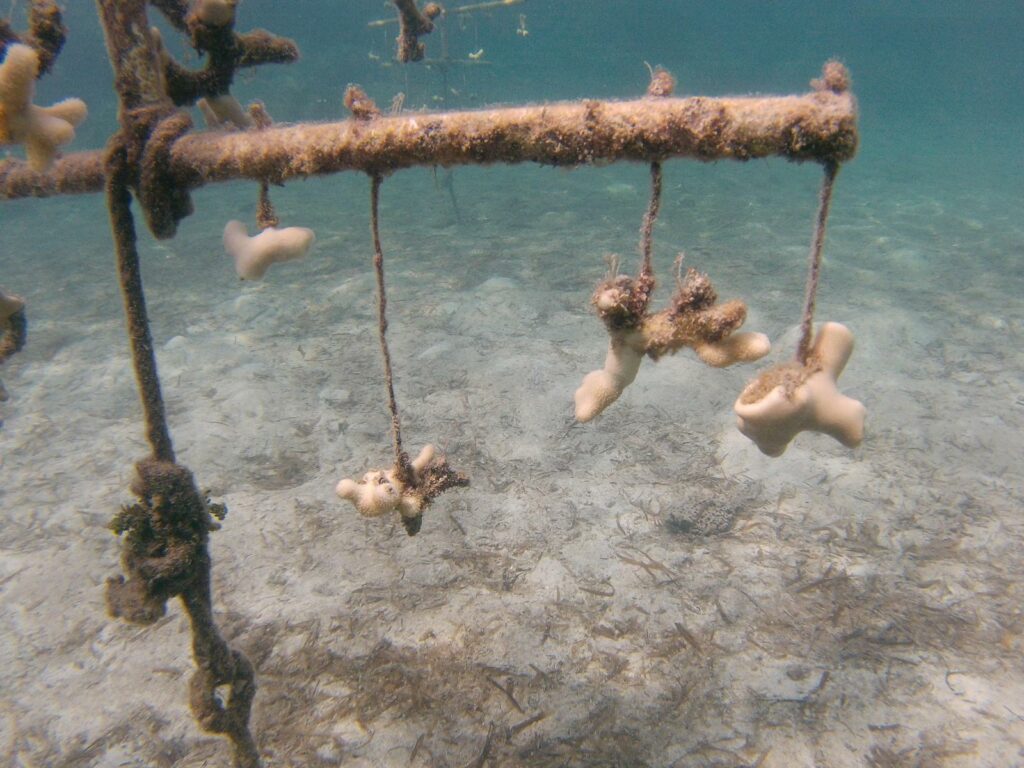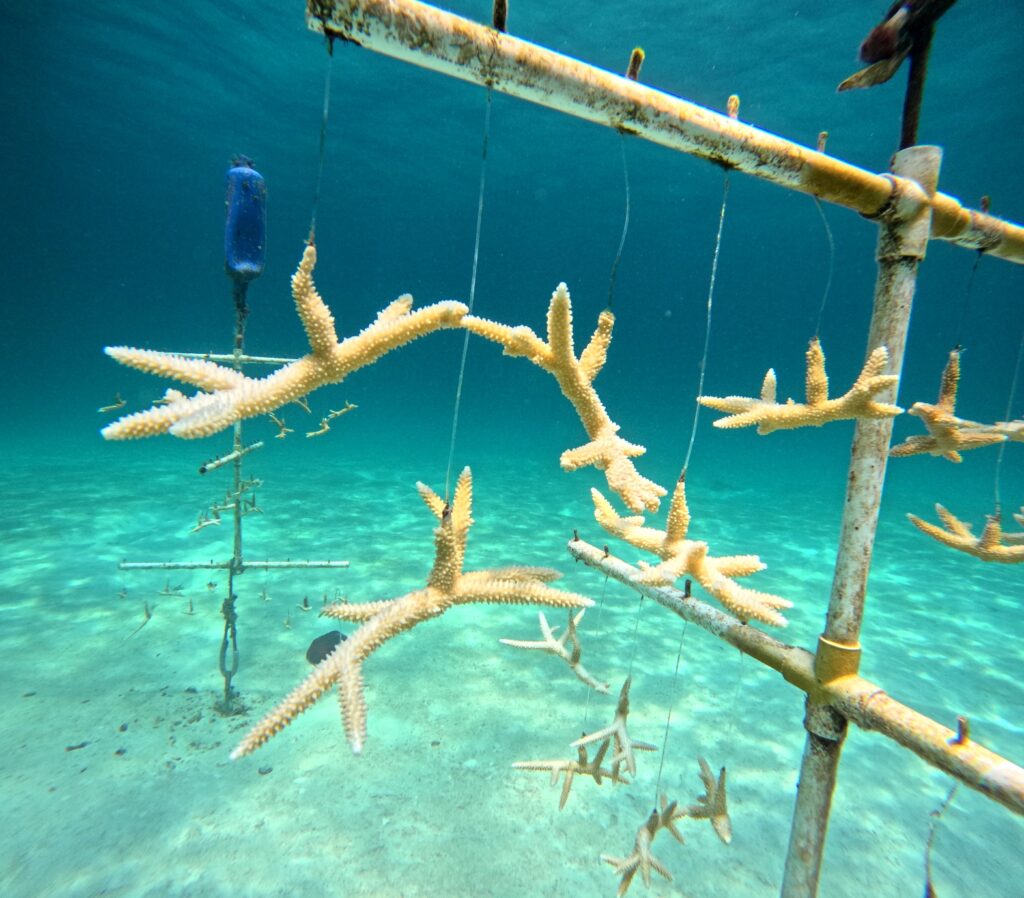The breathtaking coral reefs of The Bahamas, renowned around the world for their vibrancy and diverse marine life, are under serious and immediate threat as a powerful ocean heat wave driven by climate change is causing widespread coral bleaching and killing off entire reef ecosystems.
Over the past several weeks following sharp spikes in ocean temperature, large scale bleaching events have been discovered on many reefs throughout the country, signaling a dire emergency with far-reaching consequences for marine life and local communities. Bleaching is not just a cosmetic issue but a lethal and sometimes irreversible one. Together with the Perry Institute for Marine Science (PIMS), we at the Atlantis Blue Project Foundation (ABPF) are springing into action to assess the ongoing damage and enact emergency measures to save and restore coral reefs wherever possible.

The Struggle at Atlantis’ Offshore Nursery
The Atlantis offshore coral nursery, once a beacon of marine restoration in New Providence, now mirrors the larger ecological struggle at hand. Alarmingly, hundreds of our cultivated corals, including the critically endangered Acropora cervicornis (staghorn coral), have undergone bleaching. Even more worrisome is the bleaching observed in the wild coral colonies of both staghorn and elkhorn (Acropora palmata) species adjacent to our nursery, indicating a widespread environmental emergency.
Crisis in the Lagoon Nursery
Our shallow-water lagoon nursery faces an even more severe situation. Astonishingly, 85% of its corals are dead, with another 5% recently perished, leaving a mere 10% in a pale, weakened state. The finger coral species, Porites porites and Porites furcata, are among the hardest hit, suffering extensive bleaching.
At the nearby line nursery, the statistics are equally grim, with 70% of its corals dead and only a small fraction remaining healthy. The long-prevailing water temperature of around 28-32°C is a critical contributor to this widespread bleaching.

Understanding Coral Bleaching
Coral bleaching, often misconstrued as a death sentence, is actually a stress response. It occurs when corals, overwhelmed by conditions like rising water temperatures, expel the life-sustaining algae living in their tissues. This results in a loss of color, but not necessarily life. If stressors are mitigated promptly (e.g., if elevated seawater temperatures return to normal in time), these corals can reabsorb algae, regain their vibrant hues, and recover – a testament to their resilience and adaptability.
Dr. Craig Dahlgren, executive director of PIMS, emphasized the immediacy of the 2023 bleaching crisis. The rapid degradation of coral reefs, once thought to be a future problem, is happening now, he said. Our work in The Bahamas underscores the necessity for innovative approaches like gene banking and coral nurseries to combat this ecological emergency.

Nurseries: A Crucial Conservation Effort
At the Atlantis Blue Project Foundation, a key restoration strategy that we implement is growing endangered corals like staghorn and elkhorn species within special nurseries in the ocean. These nurseries act like safe havens away from the reef, giving corals a better chance to grow. In these nurseries, pieces of coral are attached to structures that look like frames or artificial trees, keeping them safe from predators such as snails and fireworms. This setup, where corals hang like clothes on a line or decorations on trees made of PVC pipes, helps improve the water flow around them, which is also important for their growth. When the corals grow big enough, they’re moved to nearby reefs that need more coral. This process is an important part of bringing back the health and diversity of our ocean’s reefs.
Between ABPF, PIMS, and its coral restoration offshoot, the Reef Rescue Network, The Bahamas has more than 30 coral nurseries growing thousands of corals throughout the islands. Through the use of these nurseries, we are committed to improving the condition of coral reefs by restoring populations of corals and other species that will build coral reef resilience. These actions will result in meaningful coral restoration across large spatial scales to make substantial improvements to coral reef health and contribute to our knowledge of coral biology, ecology, reef ecosystem function, and how we can improve their condition.
Written by: Lily Haines, MSc | PIMS | WhatsApp +1 (613) 791-6045 | lhaines@perryinstitute.org

